Audi Q2 VS Nissan Leaf
Audi Q2
The Audi Q2 captures attention with its bold and distinctive design, combining compact dimensions with a sporty silhouette. Inside, the cabin boasts high-quality materials and a modern infotainment system, ensuring a comfortable driving experience. With its agile handling and efficient performance, the Q2 is a perfect urban companion for those seeking both style and functionality.
more informationNissan Leaf
The Nissan Leaf stands out as a pioneering model in the realm of electric vehicles, known for its impressive blend of practicality and eco-friendliness. It offers a smooth and quiet driving experience, making it an ideal choice for city commuting and longer journeys alike. The interior design is both comfortable and intuitive, providing drivers with a sense of modernity and ease of use.
more information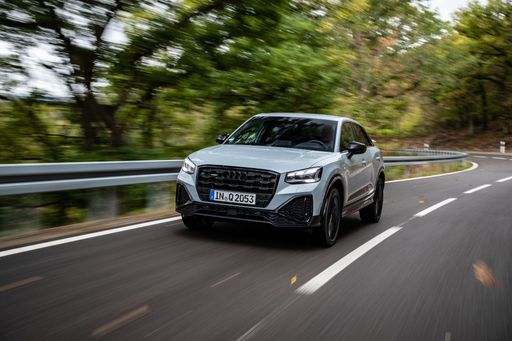 @ audi-mediacenter.com
@ audi-mediacenter.com
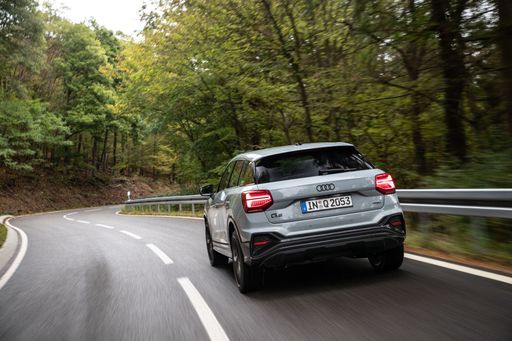 @ audi-mediacenter.com
@ audi-mediacenter.com
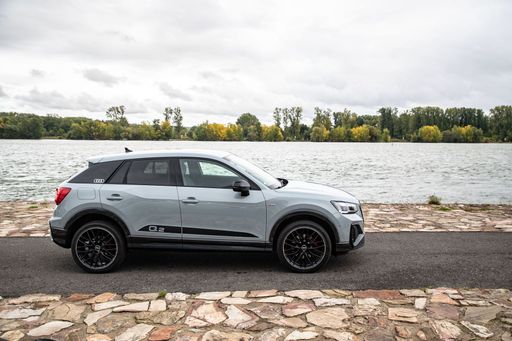 @ audi-mediacenter.com
@ audi-mediacenter.com
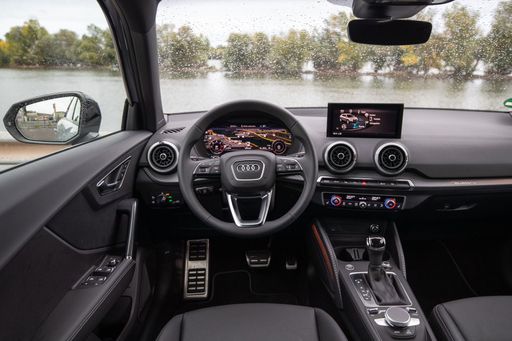 @ audi-mediacenter.com
@ audi-mediacenter.com
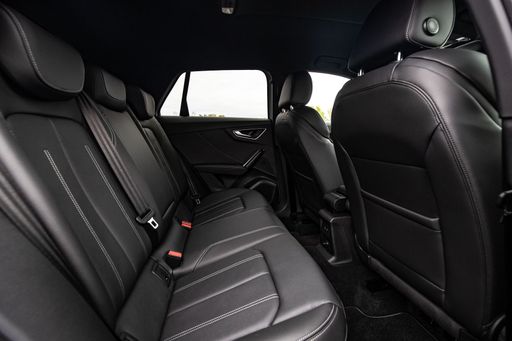 @ audi-mediacenter.com
@ audi-mediacenter.com
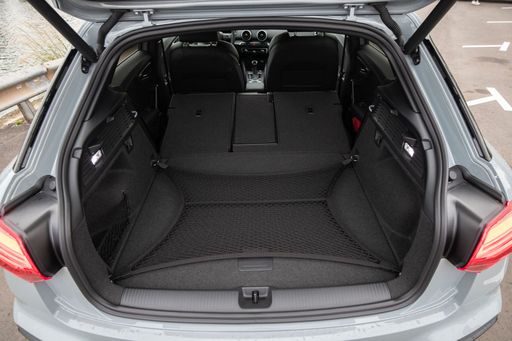 @ audi-mediacenter.com
@ audi-mediacenter.com
 @ germany.nissannews.com
@ germany.nissannews.com
 @ germany.nissannews.com
@ germany.nissannews.com
 @ germany.nissannews.com
@ germany.nissannews.com
 @ germany.nissannews.com
@ germany.nissannews.com
Costs and Consumption |
|
|---|---|
|
Price
about 26400 - 46700
$
|
Price
about 33200 - 40100
$
|
|
Consumption L/100km
5.1 - 8.4
L
|
Consumption L/100km
-
|
|
Consumption kWh/100km
-
|
Consumption kWh/100km
16.7 - 17.8
kWh
|
|
Electric Range
-
|
Electric Range
270 - 385
km
|
|
Battery Capacity
-
|
Battery Capacity
39 - 59
kWh
|
|
co2
130 - 190
g/km
|
co2
0
g/km
|
|
Fuel tank capacity
50 - 55
L
|
Fuel tank capacity
-
|
Dimensions and Body |
|
|
Body Type
SUV
|
Body Type
Hatchback
|
|
Seats
5
|
Seats
5
|
|
Doors
5
|
Doors
5
|
|
Curb weight
1330 - 1610
kg
|
Curb weight
1580 - 1756
kg
|
|
Trunk capacity
355 - 405
L
|
Trunk capacity
385 - 394
L
|
|
Length
4208 - 4216
mm
|
Length
4490
mm
|
|
Width
1794 - 1802
mm
|
Width
1788
mm
|
|
Height
1495 - 1508
mm
|
Height
1540 - 1545
mm
|
|
Payload
450 - 510
kg
|
Payload
384 - 415
kg
|
Engine and Performance |
|
|
Engine Type
Petrol, Diesel
|
Engine Type
Electric
|
|
Transmission
Manuel, Automatic
|
Transmission
Automatic
|
|
Transmission Detail
Manual Gearbox, Automat. Schaltgetriebe (Doppelkupplung)
|
Transmission Detail
Reduction Gearbox
|
|
Drive Type
Front-Wheel Drive, All-Wheel Drive
|
Drive Type
Front-Wheel Drive
|
|
Power HP
116 - 300
HP
|
Power HP
150 - 217
HP
|
|
Acceleration 0-100km/h
4.9 - 10.5
s
|
Acceleration 0-100km/h
6.9 - 7.9
s
|
|
Max Speed
197 - 250
km/h
|
Max Speed
144 - 157
km/h
|
|
Torque
200 - 400
Nm
|
Torque
320 - 340
Nm
|
|
Number of Cylinders
3 - 4
|
Number of Cylinders
-
|
|
Power kW
85 - 221
kW
|
Power kW
110 - 160
kW
|
|
Engine capacity
999 - 1984
cm3
|
Engine capacity
-
|
|
Top speed
197 - 250
km/h
|
Top speed
144 - 157
km/h
|
General |
|
|
Model Year
2024
|
Model Year
2019
|
|
CO2 Efficiency Class
D, E, F, G
|
CO2 Efficiency Class
A
|
|
Brand
Audi
|
Brand
Nissan
|
Audi Q2
The Audi Q2 demonstrates a perfect blend of compact dimensions and luxury features, making it a prominent choice in the competitive SUV segment. With an attractive exterior design, high-quality interiors, and cutting-edge technology, it stands out as a versatile vehicle for urban commuters and weekend adventurers alike.
Striking Design and Practicality
The Q2’s design is a clear reflection of Audi's sophisticated aesthetics. Its bold stance is accentuated by angular lines and a distinctive Singleframe grille. Measuring between 4208 mm and 4216 mm in length, it remains compact yet offers ample interior space for passengers and cargo alike. The rear boasts a hatchback design, contributing to a practical trunk capacity of 355 to 405 litres, perfectly suited for everyday tasks.
Engine Options and Performance
Audi caters to diverse customer preferences by offering a range of engine choices, from efficient petrol units to powerful diesels. Engine power ranges from 116 to 300 PS, ensuring lively performance, while the 0-100 km/h acceleration time varies between 4.9 and 10.5 seconds, depending on the variant. The model year 2024 continues to impress with its harmonic balance of performance and economy, with fuel consumption figures ranging from 5.1 to 8.4 L/100 km.
Advanced Transmission and Drive Technologies
The Q2 is available with both manual and automatic transmissions, including Audi’s sophisticated S tronic dual-clutch system. Front-wheel drive and all-wheel drive options offer flexibility for different driving conditions, ensuring exceptional grip and stability on the road. With available torque figures from 200 to 400 Nm, the Q2 responds adeptly to driver commands, providing a dynamic driving experience.
Cutting-Edge Technology and Interior Features
Inside the Q2, the focus on quality is evident, with premium materials and clean lines that create a refined atmosphere. The multimedia interface features the latest in connectivity, including smartphone integration and a user-friendly interface. Optional upgrades such as the Virtual Cockpit and advanced driver assistance systems further enhance both comfort and safety, ensuring a worry-free driving experience.
Efficiency and Eco-Friendliness
Environmental considerations are integrated into the Audi Q2’s design, with CO2 emissions ranging from 130 to 190 g/km, depending on the chosen engine. The Q2 is available in several equipment lines such as ‘advanced’ and ‘S line’, allowing buyers to personalise their vehicle while taking advantage of the brand's commitment to sustainability. Fuel efficiency is balanced without compromising performance, confirming Audi's dedication to eco-friendly driving.
Conclusion: The Ideal Compact SUV
In summary, the Audi Q2 successfully embodies the perfect compact SUV, making it suitable for a variety of lifestyles. Its combination of distinctive design, flexible performance options, cutting-edge technology, and emphasis on efficiency make it a compelling choice for those seeking a premium vehicle that stands out on the roads and in the city.
Nissan Leaf
Introduction to the Nissan Leaf: A Pioneer in Electric Mobility
The Nissan Leaf has established itself as a trailblazer in the realm of electric vehicles (EVs) since its launch. As we delve into its present-day iterations, the Leaf continues to soar in popularity due to remarkable advancements in technology and sustainability. Let's explore what makes the Nissan Leaf a standout in today's automotive market.
Power and Performance: Under the Hood of the Nissan Leaf
The Nissan Leaf boasts a power output ranging from 150 to 217 PS, depending on the battery option chosen. The vehicle's electric motor, a product of cutting-edge engineering, offers instant torque ranging from 320 to 340 Nm, resulting in impressive acceleration capabilities. The 0 to 100 km/h dash is achieved in as little as 6.9 seconds, showcasing its prowess in electric performance.
Battery Technology: Efficient Energy Management
When discussing the Nissan Leaf, battery technology is at the forefront. The available battery capacities range from 39 to 59 kWh, supporting an electric range between 270 to 385 km. This flexibility allows drivers to choose a model that best fits their driving habits, providing peace of mind for longer journeys without frequent recharging.
Sustainability: The Environmental Edge
One of the primary attractions of the Nissan Leaf is its commitment to sustainability. As an all-electric vehicle, it produces zero CO2 emissions, placing it in the top tier of the CO2-efficiency class with an 'A' rating. This clean energy approach contributes significantly to reducing environmental impact and supports Nissan's drive towards a greener future.
Design and Comfort: Aesthetic Appeal and Practicality
The Nissan Leaf is not just about efficiency; it's also designed for comfort and utility. With its sleek hatchback body and dimensions of 4490 mm in length, 1788 mm in width, and a height of up to 1545 mm, it offers ample interior space. The boot capacity ranges from 385 to 394 litres, providing sufficient storage for everyday needs. The model accommodates five passengers comfortably, ensuring a pleasant ride for everyone.
Innovations and Safety: Advanced Features for Peace of Mind
Nissan equips the Leaf with an array of intelligent features that enhance safety and convenience. The available equipment lines, including N-CONNECTA, Tekna, e+ N-CONNECTA, and e+ Tekna, offer varying levels of technology integration. ProPILOT Assist, e-Pedal, and a comprehensive suite of driver-assistance technology are just a few examples that highlight Nissan's commitment to innovation in the EV market.
Conclusion: The Nissan Leaf Continues to Lead
With prices ranging from €35,900 to €43,400, the Nissan Leaf remains an attractive choice for those looking to embrace electric mobility. It perfectly balances performance, design, and sustainability, making it a compelling choice in the competitive EV landscape. The Nissan Leaf not only represents the future of driving but also reinforces why it continues to be a leader in the electric vehicle community.
